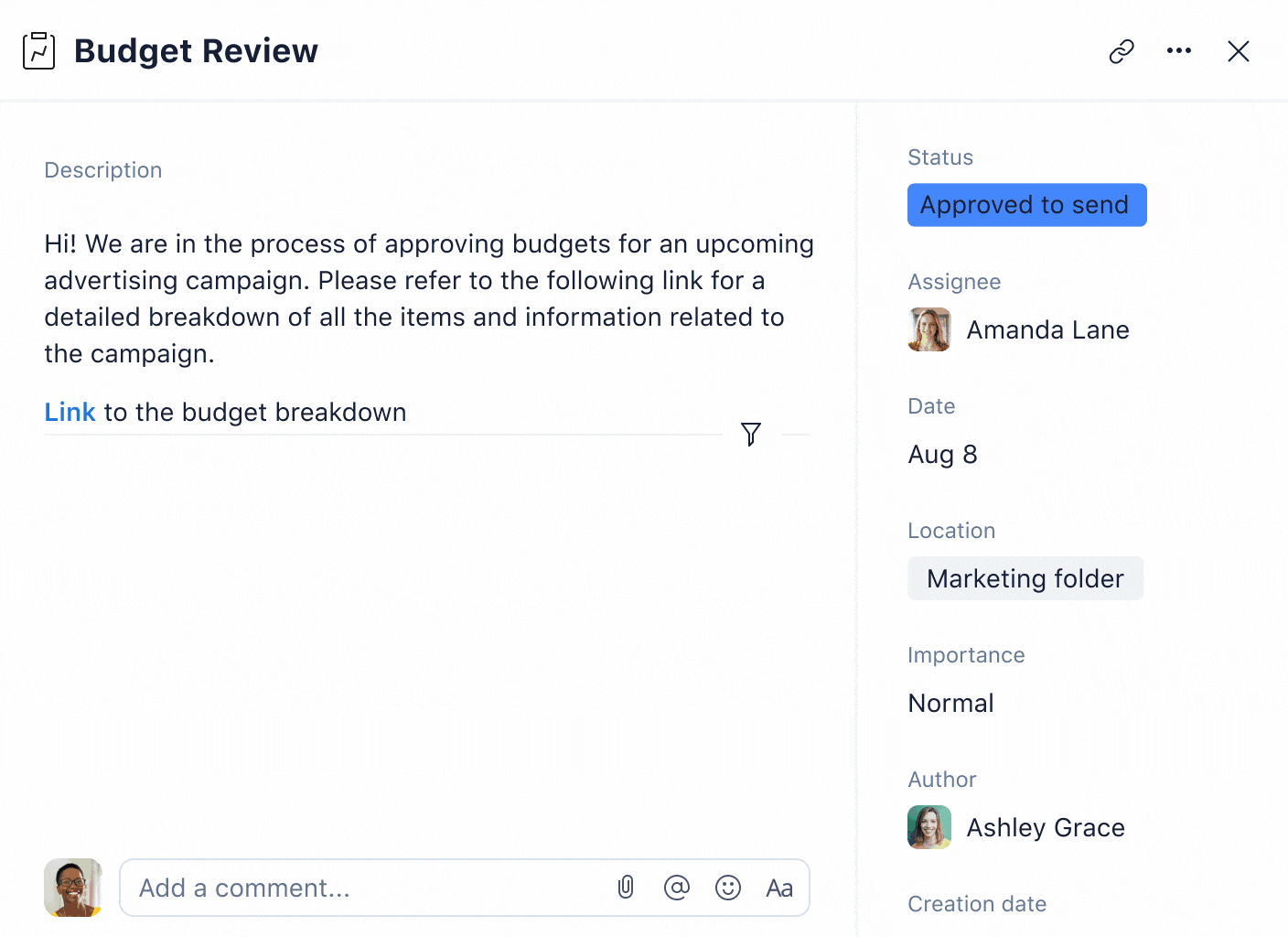Key takeaways:
- What is effectiveness? Effectiveness measures how well a business achieves its objectives and delivers customer value, focusing on understanding needs and aligning strategies with goals.
- What is efficiency? Efficiency involves optimizing resource use and streamlining operations to save time and costs while maximizing productivity.
- Why are both concepts important for business success? Effectiveness drives innovation and alignment with goals, while efficiency reduces waste and enhances profitability, contributing to competitive advantage.
- How can businesses balance effectiveness and efficiency? Businesses can do so by setting clear goals, aligning processes, evaluating performance, fostering continuous improvement, investing in technology, and training employees.
- How can Wrike help? Wrike boosts both efficiency and effectiveness through project management tools that streamline workflows, enhance collaboration, and track progress seamlessly.
Efficiency. Effectiveness. You must have heard these two words countless times. But what do they really mean?
Efficiency and effectiveness are the dynamic duo of productivity. In short, efficiency is all about getting things done in record time, while effectiveness is focused on hitting the bullseye even if it means taking a few more carefully aimed shots.
In this article, we will take an in-depth look at effectiveness vs. efficiency. How are they different? How do they work together? We will also offer some actionable tips for improving both.
But remember — you don’t have to do all the work yourself. You can leverage collaborative work management platforms like Wrike to boost both efficiency and effectiveness, and get more done in less time.
Eliminate wasted efforts and increase efficiency with Wrike — start your free trial now.
Defining effectiveness and efficiency
Effectiveness and efficiency are two words that businesses should be keenly aware of. They are not mutually exclusive concepts, since a business that is both effective and efficient is more likely to achieve sustainable success in a competitive marketplace.
What is effectiveness?
Effectiveness measures how well a business achieves its objectives and delivers value to its customers. It goes beyond simply completing tasks; it involves understanding customer needs, addressing pain points, and providing solutions that meet or exceed expectations.
When evaluating a business’s effectiveness, consider the alignment between its goals and strategies. A company that matches its strategy with its goals is more likely to succeed and stay competitive.
What is efficiency?
Efficiency measures how well resources are used to achieve desired outcomes. It involves streamlining operations and maximizing productivity. By being efficient, businesses can reduce costs, improve profitability, and gain a competitive edge. They can also use technology to automate repetitive tasks and enhance communication and collaboration.
When analyzing a business’s efficiency, consider various factors that can impact resource utilization. One critical component is optimizing processes and workflows. By eliminating unnecessary steps, businesses can improve efficiency and reduce resource waste.
The importance of effectiveness and efficiency in business
Effectiveness and efficiency are two key factors contributing to a business’s success. While they are distinct concepts, both play a key role in ensuring organizations thrive in a competitive market.
Role of effectiveness in business success
Let’s say you’re leading a tech startup and your goal is to launch an innovative product that changes how people manage their daily tasks. Focusing on effectiveness can be a game changer to your product launch.
This will involve zeroing in on the activities that directly contribute to your product launch. You will also have to make tough choices, like investing in developers and prioritizing user experience research. Every decision, from the development platform you choose to the features you decide to include in your first release, is made with that launch in mind. That’s effectiveness in action!
Effectiveness is closely linked to innovation. By constantly seeking ways to improve and adapt to changing market dynamics, organizations can stay ahead of the curve and remain relevant.
For example, you can use workflow management software like Wrike to map out your project’s life cycle, from ideation to launch. A dashboard will help you and your team track what needs to be done, by whom, and when. This way, you can ensure that every task, every sprint, and every update aligns with your objectives, keeping the team focused and on track.

Role of efficiency in business success
When a business is efficient, it can streamline its operations and eliminate unnecessary steps or activities that do not contribute to the desired outcomes. By doing so, businesses can save time, money, and resources, allowing them to allocate these valuable assets more effectively.
However, there must be a balance. For instance, according to Wrike’s 2023 efficiency report, 57% of business leaders have heard their teams express concerns about being overworked. That’s more than half! It underlines the balance businesses need to find between pushing for efficiency and ensuring their teams aren’t stretched too thin. What’s more, 47% of leaders are feeling the pressure to enhance efficiency while also watching out for burnout.
An all-in-one software can help maintain this balance by organizing workloads efficiently, as evidenced by companies like Aerotek and Nickelodeon, which report handling more work with less stress, thanks to Wrike.
Jeff Hartlieb, Project Director for Nickelodeon, says:
“Wrike provided a system for us that was simple, clean, and easy for everybody to use — which made our work much more efficient.”
Key differences between effectiveness and efficiency
There are several differences between effectiveness and efficiency.
Goals vs. processes
Effectiveness is primarily concerned with achieving goals, emphasizing the impact and result of actions, and producing desired outcomes. Organizations strive to align their efforts with their objectives so that they are making progress toward their intended goals.
Efficiency, on the other hand, is focused on streamlining operations. This includes eliminating unnecessary activities and making the most of available resources. Organizations prioritizing efficiency constantly seek ways to improve productivity and reduce waste.
Example: A company that aims to increase its market share by 10% within a year would consider implementing strategies and initiatives that contribute to the achievement of this goal. It would track progress, evaluate marketing campaigns, and make changes if needed to achieve the desired result.
With Wrike’s project reports, the company can monitor the effectiveness of each initiative, seeing instantly what’s working and what’s not. The real-time data allows them to make informed decisions quickly, ensuring that they’re doing the right things to move the needle on market share.

Quality vs. quantity
Effectiveness emphasizes achieving objectives with a high level of quality. Organizations prioritizing effectiveness understand the importance of delivering products or services that meet and exceed customer requirements.
Meanwhile, efficiency focuses on maximizing output with minimal waste and reducing costs. Organizations prioritizing efficiency strive to produce more with less, optimizing their resources to achieve higher productivity.
Example: A software development company that aims to be effective would focus on delivering bug-free software that provides a seamless user experience. It would focus on testing, user feedback, and improvement to ensure products are of high quality.
Wrike’s workflow automation can streamline these development cycles. By automating parts of the process, the team can focus on the creative and complex tasks that require a human touch. This means they can churn out new releases quicker but still keep the bar high on quality.


Businesses often set big goals. Let’s say your tech company wants to be the first to market with a groundbreaking app. That’s your effectiveness goal right there. But to make this happen, you’ve got to be efficient, too — meaning you’ve got to develop that app quickly without blowing the budget or overworking your team.
Now, here’s where it gets tricky. The drive for efficiency can sometimes mean cutting corners, which can lead to a not-so-great product. On the other hand, focusing solely on effectiveness could mean perfecting the app to the point where it misses the market window or goes way over budget. Striking that balance is the art.
It’s not impossible! You need to be smart with your planning and leverage the right tools. With Wrike’s templates, you can lay out each step of your app development, making sure nothing gets missed. You can assign tasks, set deadlines, and keep an eye on the budget all in one place.
Achieving both efficiency and effectiveness means being strategic — knowing when to push forward and when to ease back. So, for any business looking to nail both, remember: balance is key.
How to balance effectiveness and efficiency
To strike a balance between effectiveness and efficiency, organizations need to adopt some strategies that consider both aspects:
- Set clear goals: Clearly define the organization’s goals and objectives. This will provide a sense of direction and ensure that efforts are aligned toward achieving desired outcomes.
- Align goals with efficient processes: Once the goals are set, identify and implement efficient processes to achieve them. Streamlining workflows, eliminating unnecessary steps, and automating repetitive tasks can significantly improve efficiency.
- Evaluate and measure performance: Regularly evaluate performance against set goals and measure key performance indicators (KPIs). This will help identify areas for improvement so that resources are used effectively.
- Foster a culture of continuous improvement: Encourage staff to contribute ideas and suggestions for process improvement. Embrace a culture of continuous learning and innovation, where employees are empowered to find more efficient ways of doing things without compromising effectiveness.
- Invest in technology: Leverage technology and automation tools to streamline operations and enhance efficiency. Implementing software solutions, such as project management systems or customer relationship management (CRM) software, can assist in optimizing processes and improve overall effectiveness.
- Train and develop employees: Invest in training and development programs to enhance employees’ skills and knowledge. Equipping them with the necessary tools and expertise will enable them to perform their tasks efficiently and effectively.
Wrike can help boost efficiency and effectiveness
At the start of the year, Wrike’s Vice President of Product, Alexey Korotich, shared some insightful predictions for 2024 that emphasize the importance of efficiency and leveraging collaborative work management (CWM) platforms.
He said:
“This shift toward efficiency and work management has set the stage for 2024. The trends indicate a significant rise in IT budgets, with a notable portion allocated to the adoption of new work management software.”
And here’s the key thing: Wrike’s powerful CWM platform seamlessly integrates into your existing workflows, complementing and elevating the way your teams already work rather than overhauling or disrupting their processes. With Wrike, you can:
- Manage incoming requests with dynamic request forms
- Track your project’s progress with Kanban boards
- Adjust deadlines instantly on Gantt charts to see how changes might affect your overall timeline
- Bring all your apps and teams together in one place
With Wrike, you can find that sweet spot where you’re hitting your targets without wasting a drop of effort.
Are you ready to build an effective and efficient team? Then, you should begin your two-week free trial right away.
Note: This article was created with the assistance of an AI engine. It has been reviewed and revised by our team of experts to ensure accuracy and quality.
Power the Modern, Agile Enterprise
Crush your goals and keep moving forward with Wrike's work management platform.







